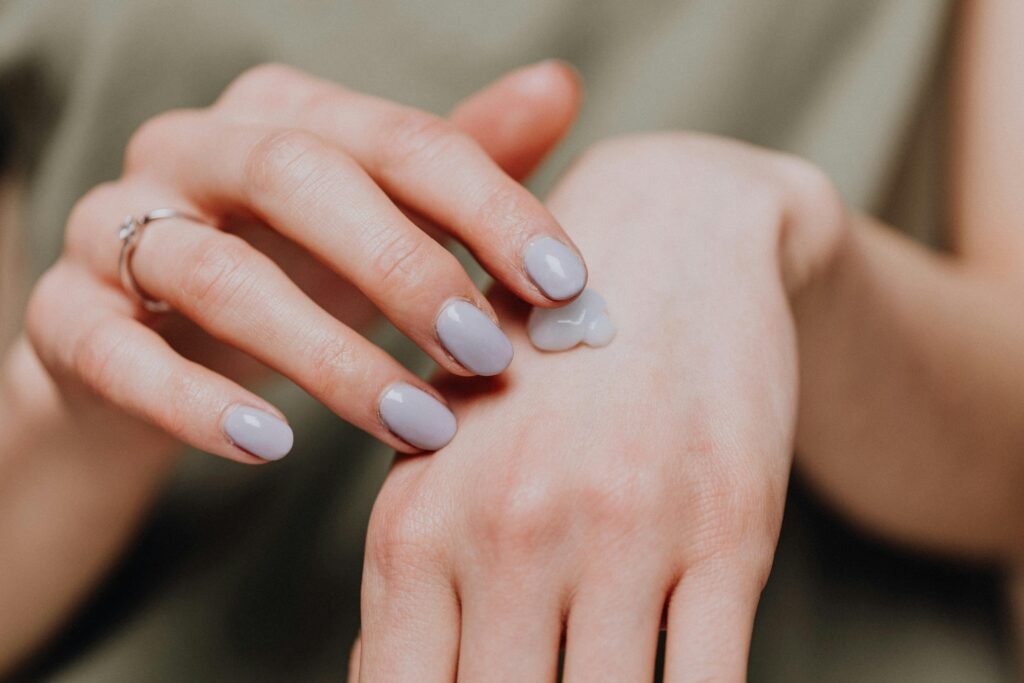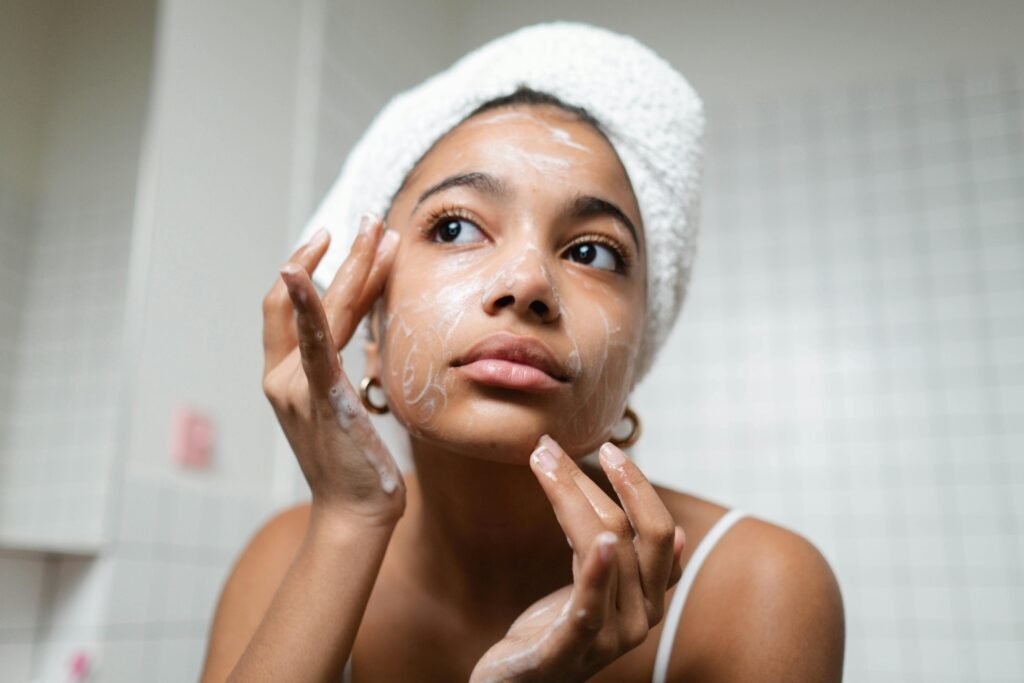If you have oily skin, you might think that moisturizer is the last thing you need. After all, your skin already produces plenty of oil—why add more? The idea of slathering on a moisturizer for oily skin may even sound like a recipe for clogged pores and extra shine. But here’s the truth: skipping moisturizer can actually make your oily skin worse.
Let’s dive into why moisturizer for oily skin is not just necessary, but essential for keeping your skin balanced, healthy, and happy.
Why Oily Skin Still Needs Moisturizer

Your skin produces oil (sebum) to keep itself hydrated. However, excess oil production doesn’t necessarily mean your skin is well-moisturized. In fact, when your skin is dehydrated, it may overcompensate by producing even more oil. This leads to a greasy complexion, breakouts, and even flaky patches. A good moisturizer for oily skin helps regulate this process.
What Happens When You Skip Moisturizer?
If you ditch moisturizer, thinking it will help keep your skin matte, you could be making things worse. Here’s what happens:
- Increased Oil Production – Without proper hydration, your skin signals your sebaceous glands to produce even more oil, leaving you shinier than ever.
- Breakouts & Clogged Pores – Dehydrated skin can trigger inflammation, making your pores more susceptible to clogging and breakouts.
- Uneven Skin Texture – Lack of hydration can make your skin look rough, flaky, and dull, even if it’s oily.
- Premature Aging – Moisturizer helps keep skin plump and smooth, preventing fine lines and wrinkles from appearing too soon.
Choosing the Right Moisturizer for Oily Skin
Not all moisturizers are created equal, and if you have oily skin, you need a formula that hydrates without making you feel greasy. Look for these key ingredients:
- Hyaluronic Acid – A lightweight, powerful hydrator that draws moisture to the skin without clogging pores.
- Glycerin – Helps retain moisture while keeping your skin feeling light and breathable.
- Niacinamide – Balances oil production and soothes irritation.
- Gel-Based or Oil-Free Formulas – These absorb quickly and leave your skin feeling fresh, not greasy.
Common Myths About Moisturizer for Oily Skin
Myth 1: Moisturizer Makes Oily Skin Worse
Reality check: Using the right kind of moisturizer can actually help reduce excessive oil production over time. A lightweight, non-comedogenic formula balances your skin without suffocating it.
Myth 2: You Only Need Moisturizer in the Winter
Your skin needs hydration year-round. Even in the summer, environmental factors like sun exposure and air conditioning can dehydrate your skin. A moisturizer for oily skin keeps it resilient no matter the season.
Myth 3: You Can Skip Moisturizer If You Use a Serum
Serums are great, but they aren’t a replacement for moisturizer. Serums provide targeted treatments, while moisturizers help lock in hydration and create a protective barrier.
How to Apply Moisturizer for Oily Skin the Right Way
Applying moisturizer the right way can make a world of difference. Follow these simple steps:
- Start with a Clean Face – Use a gentle, oil-balancing cleanser.
- Apply Toner (Optional) – A lightweight toner can prep your skin for better absorption.
- Use a Pea-Sized Amount – Less is more! A small amount is enough to keep your skin hydrated without feeling heavy.
- Gently Pat, Don’t Rub – Pressing the product into your skin helps it absorb better.
- Give It Time to Absorb – Wait a minute before applying sunscreen or makeup.
When to Apply Moisturizer

Consistency is key! Moisturizer should be applied twice daily—once in the morning and once at night—to keep your skin balanced. If you’re using acne treatments or exfoliating products, moisturizing afterward helps reduce irritation and dryness.
Can You Go Completely Moisturizer-Free?
Technically, you could, but why would you want to? If you’ve ever noticed your skin getting oilier throughout the day, it’s probably because your skin is trying to compensate for a lack of hydration. A good moisturizer for oily skin helps keep that excess shine in check.
Yes, You Need a Moisturizer for Oily Skin!
Skipping moisturizer might seem like a quick fix for oily skin, but in reality, it does more harm than good. The key is choosing the right moisturizer—lightweight, hydrating, and non-greasy. When you give your skin the hydration it needs, it actually becomes less oily over time.
So, if you’ve been avoiding moisturizer, it’s time to reconsider. Give your skin the balance it craves, and you’ll be rewarded with a healthier, more radiant complexion.
Frequently Asked Questions: Do You Really Need a Moisturizer If You Have Oily Skin?
1. Do You Really Need a Moisturizer If You Have Oily Skin?
Yes, 100%. I know it sounds weird—why add more moisture when your skin is already greasy? But here’s the thing: oily skin doesn’t necessarily mean hydrated skin. A lot of times, your skin overproduces oil because it’s actually dehydrated and trying to compensate. A good moisturizer (preferably lightweight and non-comedogenic) helps balance things out, so your skin isn’t working overtime and turning you into a greaseball. Plus, skipping moisturizer can actually make your skin even oilier because it panics and produces even more oil. So yeah, moisturizer is still a must!
2. Can Skipping Moisturizer Help Reduce Breakouts on Oily Skin?
You’d think so, right? Like, less product = less clogged pores = fewer breakouts. But it’s kinda the opposite. When you skip moisturizer, your skin goes into survival mode and starts pumping out more oil to compensate. More oil means a higher chance of clogged pores and breakouts. The trick is to use a light moisturizer—think gel-based, oil-free, or something with mattifying properties. Also, look for ingredients like niacinamide or hyaluronic acid that hydrate without making you feel like a buttered pancake.
3. How Do You Pick the Right Moisturizer for Oily Skin?
If you’re worried about feeling greasy, go for lightweight, gel-based formulas that absorb fast. Anything labeled “non-comedogenic” means it won’t clog pores, which is key. Ingredients like hyaluronic acid help hydrate without heaviness, while niacinamide can actually help regulate oil production. Avoid heavy oils like coconut oil (it can be too much for oily skin), but don’t be scared of all oils—squalane and jojoba are actually pretty friendly to oily skin. Also, if you want to skip an extra step, a moisturizer with SPF is a win. Two birds, one stone.
4. Will Using a Moisturizer Make My Skin Look Shinier?
Not necessarily. If you use the wrong kind (like thick, heavy creams), then yeah, you might look extra glowy—but in a way you don’t want. But a good oil-free moisturizer will actually help regulate shine. Some even have a matte finish, so they absorb excess oil throughout the day. Also, using the right moisturizer can help your skin chill out and produce less oil in the long run. So, instead of looking like you dipped your face in Vaseline by noon, you might actually get a nice, balanced glow.
5. Can Moisturizer Help Control Oil Production?
Yep! It sounds counterintuitive, but keeping your skin properly hydrated can actually help slow down oil production. Think of your skin like a person—if you don’t give it what it needs, it’s gonna freak out and overcompensate. A hydrating (but not heavy) moisturizer tells your skin, “Hey, we’re good! No need to overdo it on the oil.” Over time, this can make your face less greasy. Consistency is key, though. If you only slap on moisturizer every now and then, your skin won’t get the memo.
6. Can I Just Use a Serum Instead of a Moisturizer If I Have Oily Skin?
Serums are great, but they’re not a replacement for moisturizer. They’re more like a boost—a sidekick, not the main character. Most serums are water-based and absorb quickly, which is great, but they don’t usually provide enough of a barrier to lock in hydration. If you use a serum alone, you might actually lose moisture throughout the day, making your skin produce more oil. If you really hate the feeling of moisturizer, you can try a super-light gel cream or even a hydrating mist on top of your serum. Just don’t leave your skin hanging with nothing.
7. Is There Ever a Time When Someone With Oily Skin Should Skip Moisturizer?
Not really—unless you’re using something like a super-rich overnight mask or a sunscreen that’s hydrating enough to double as a moisturizer. But even then, it’s more about choosing the right product rather than skipping it entirely. The only time you might want to avoid moisturizer is if you’re dealing with an active breakout and layering on too many products. In that case, simplifying your routine and using a hydrating toner or essence might be a good temporary fix. But on a daily basis? Your skin will always need some level of hydration to stay balanced.
